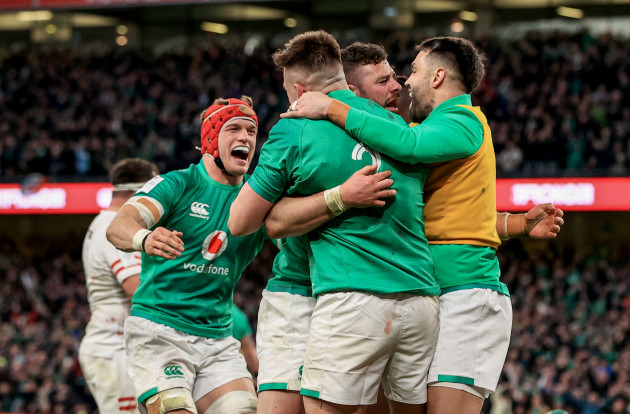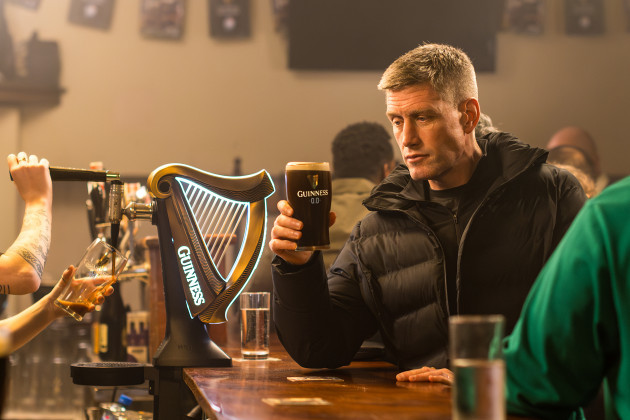COULD THE APPEAL of the Six Nations be due in part to its ability to stay the same in a constantly changing sporting world?
Sure, the six were once five, and five replaced four. The stadiums have been rebuilt, the hits are by leagues harder, the tickets pricier and tactics more sophisticated – but in tone and substance the competition remains consistent.
It takes place in the early months of the year, it’s Europe’s best playing each other in a simple format, which everyone from the fanatic to the occasional viewer can understand and get behind.
This counts for a lot, especially to the floating sports fans who over the years have seen the League of Ireland moved from winter to summer, the World Cup switch to winter, the All Ireland finals forgo their early autumn slots, and St Patrick’s Day club finals go elsewhere. A place for everything, just with many things in a slightly different place than before.
The Six Nations is there with The Grand National, The Masters and Wimbledon and a few other pillars which have stayed put. In some cases it makes sense to move a competition to another time, but there is much to be recommended for standing your ground. The busiest pubs within walking distance of this Dublin office are the ones which have stayed materially the same for generations, while those which have chased fashion have boomed and shut.
Not that the Six Nations is above chasing fashion – the sorry attempt by way of a bland Netflix documentary is only one example. We could go on and add intrusive, buzz-killing stadium tannoys and pyro and work our way down, but that would be to miss the point which is that for a great many people the start of the Six Nations heralds the most exciting and thought-consuming time of the year: loads of top class rugby on TV, the Premier League past the midway point and crunch games coming fast, the League of Ireland starting again – even if a few of us would rather it stopped for June, July and August instead. Perhaps that bit is only me.
The Six Nations is a hulking log thrown onto the fire when you need it most; something solid to bridge the gap from cold and wet winter to cold and wet early spring. The essence endures, even if it has changed in one particular way.
Ireland can expect to win more matches than they lose. This was not always the case for those of an age.
The first Six Nations that gripped me was in 1986. Rugby hadn’t really appealed before, but my Dad had something to tell me about. The glorious Triple Crown winners of 1985! The try that kept that beat Scotland and kept Ireland on course.
They attacked down the blindside from a scrum, then, when held up went wide, through the hands of Paul Deane on the loop, Brendan Mullin and out to Trevor Ringland on the wing, who ran like he was about to miss a flight.
Triple Crown, eh? Glory, yeah? Where do I sign?
The following Saturday we sat in front of the TV as Ireland took to Parc des Princes. Difficult place to play, my Dad said, adding something about passionate French fans with trumpets.
Michael Kiernan booted Ireland into a 3-0 lead. Great start, keep it going boys! From there until about February 19, 2000 when fresh faces Shane Horgan, Ronan O’Gara, John Hayes, Simon Easterby and Peter Stringer helped Ireland to a 44-22 win against Scotland, it’s fair to say we did not keep it going.
There were great some great days and moments which you could not forget: Noel Mannion running the length of Cardiff Arms Park in 1989, Mick Galwey barrelling over against England in 93, Simon Geoghegan dancing his way through a year later; Geoghegan the flying figure who shot electricity through many a hopeless mission.
Between 1986 and 98 there were three wooden spoons while Ireland won zero championships, something they would not even do in this century until 2009. Since then there have been four more.
Tom English, The BBC Scotland Rugby Correspondent, told The 42’s Rugby Weekly Extra podcast before the World Cup that after the 1999 competition he and fellow rugby writers discussed whether they had any job security. Who would want to read about this team?
Since that day in early 2000 against Scotland, Ireland have won seven Triple Crowns and three Grand Slams and even the bad days have been pretty good compared to what went before.
Journalism is a precarious old business by now, those who report on rugby are more secure than most.
Some wonder how the surge in interest in the game would survive a dip in performance from the Ireland. We’re not talking about the customary quarter-final exit or the post World Cup hangover Ireland sometimes have. More the 1992 standard when Ireland played four, lost four, scored 46 points in the process, while conceding 116.
I’m not sure, but I am about one thing. No matter how bad things get for Ireland, half the country will still tune into the Six Nations, just as they did when Ireland couldn’t buy a win and, indeed, suffered many undignified wallopings in Paris and Twickenham.
The Five Nations worked then as it does now with six. It is an advertisers’ dream, with everything from mum’s purse to ROG’s Hibero French repackaged and resold. And the commercial importance of the Six Nations to unions such as the IRFU is well known.
Yet this is because it’s all based on something real, a competition that echoes through the decades and commands attention. Tonight every rugby fan in the country and even the not totally insignificant number who hope Ireland lose so this rugby bubble gets popped will tune in.
From the devoted to the casually enthusiastic to the vehemently disgusted, come February, we all know what time it is.



